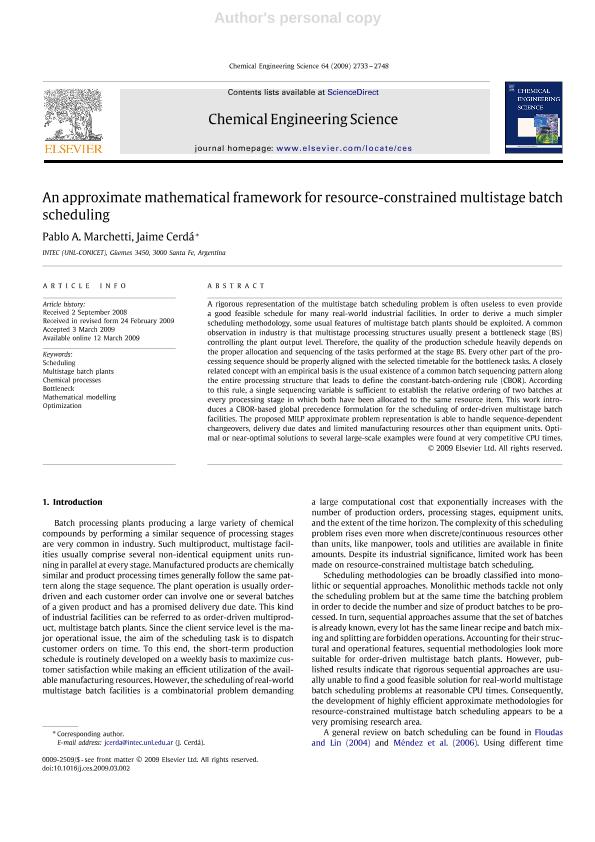Mostrar el registro sencillo del ítem
dc.contributor.author
Marchetti, Pablo Andres

dc.contributor.author
Cerda, Jaime

dc.date.available
2019-05-15T15:43:53Z
dc.date.issued
2009-06
dc.identifier.citation
Marchetti, Pablo Andres; Cerda, Jaime; An approximate mathematical framework for resource-constrained multistage batch scheduling; Pergamon-Elsevier Science Ltd; Chemical Engineering Science; 64; 11; 6-2009; 2733-2748
dc.identifier.issn
0009-2509
dc.identifier.uri
http://hdl.handle.net/11336/76353
dc.description.abstract
A rigorous representation of the multistage batch scheduling problem is often useless to even provide a good feasible schedule for many real-world industrial facilities. In order to derive a much simpler scheduling methodology, some usual features of multistage batch plants should be exploited. A common observation in industry is that multistage processing structures usually present a bottleneck stage (BS) controlling the plant output level. Therefore, the quality of the production schedule heavily depends on the proper allocation and sequencing of the tasks performed at the stage BS. Every other part of the processing sequence should be properly aligned with the selected timetable for the bottleneck tasks. A closely related concept with an empirical basis is the usual existence of a common batch sequencing pattern along the entire processing structure that leads to define the constant-batch-ordering rule (CBOR). According to this rule, a single sequencing variable is sufficient to establish the relative ordering of two batches at every processing stage in which both have been allocated to the same resource item. This work introduces a CBOR-based global precedence formulation for the scheduling of order-driven multistage batch facilities. The proposed MILP approximate problem representation is able to handle sequence-dependent changeovers, delivery due dates and limited manufacturing resources other than equipment units. Optimal or near-optimal solutions to several large-scale examples were found at very competitive CPU times.
dc.format
application/pdf
dc.language.iso
eng
dc.publisher
Pergamon-Elsevier Science Ltd

dc.rights
info:eu-repo/semantics/openAccess
dc.rights.uri
https://creativecommons.org/licenses/by-nc-sa/2.5/ar/
dc.subject
Bottleneck
dc.subject
Chemical Processes
dc.subject
Mathematical Modelling
dc.subject
Multistage Batch Plants
dc.subject
Optimization
dc.subject
Scheduling
dc.subject.classification
Otras Ingeniería Química

dc.subject.classification
Ingeniería Química

dc.subject.classification
INGENIERÍAS Y TECNOLOGÍAS

dc.title
An approximate mathematical framework for resource-constrained multistage batch scheduling
dc.type
info:eu-repo/semantics/article
dc.type
info:ar-repo/semantics/artículo
dc.type
info:eu-repo/semantics/publishedVersion
dc.date.updated
2019-05-14T13:52:32Z
dc.journal.volume
64
dc.journal.number
11
dc.journal.pagination
2733-2748
dc.journal.pais
Países Bajos

dc.journal.ciudad
Amsterdam
dc.description.fil
Fil: Marchetti, Pablo Andres. Consejo Nacional de Investigaciones Científicas y Técnicas. Centro Científico Tecnológico Conicet - Santa Fe. Instituto de Desarrollo Tecnológico para la Industria Química. Universidad Nacional del Litoral. Instituto de Desarrollo Tecnológico para la Industria Química; Argentina
dc.description.fil
Fil: Cerda, Jaime. Consejo Nacional de Investigaciones Científicas y Técnicas. Centro Científico Tecnológico Conicet - Santa Fe. Instituto de Desarrollo Tecnológico para la Industria Química. Universidad Nacional del Litoral. Instituto de Desarrollo Tecnológico para la Industria Química; Argentina
dc.journal.title
Chemical Engineering Science

dc.relation.alternativeid
info:eu-repo/semantics/altIdentifier/doi/http://dx.doi.org/10.1016/j.ces.2009.03.002
Archivos asociados
